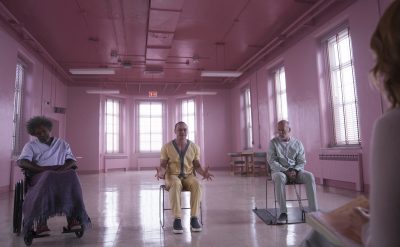
Glass – (L-R) Elijah Price/Mr. Glass (Samuel L. Jackson), Kevin Wendell Crumb/The Horde (James McAvoy), David Dunn/The Overseer (Bruce Willis), and Dr. Ellie Staple (Sarah Paulson as Dr. Ellie Staple) – Photo courtesy of Universal Pictures.
M. Night Shyamalan got his career back on track with a couple of self-financed films (The Visit, Split) that did well critically and at the Box Office.
The revelation that Split was a sequel (to Unbreakable, to my mind his best film) provoked a lot of speculation – along with the critical acclaim and financial success.
Glass is neither as deliberate and moody as Unbreakable nor as spectacular as Split, but it is a solid conclusion to the trilogy.
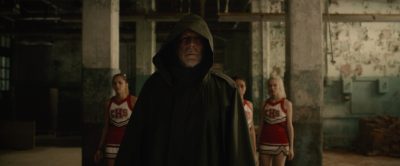
Glass – David Dunn/The Overseer (Bruce Willis) – Photo courtesy of Universal Pictures.
On the way to last night’s early screening of Glass, a colleague with whom I was riding, noted that Rotten Tomatoes had Glass sitting in 30-40% range.
Following the movie – which we both enjoyed – he said that, after he wrote his review, he would be looking at some of the reviews to see what it was that so many critics disliked.
Glass opens with a brief prologue that recaps the most important bits form the two earlier films as well as showing The Beast’s (James McAvoy) new collection of victims – four cheerleaders, hosted by Kevin Wendell Crumb’s Hedwig personality.
The film then shifts to David Dunne (Bruce Willis), who is walking the streets as what the press calls The Overseer. He follows a couple of punks who’d videoed themselves as one sucker punched a passerby – and deals out a bit of comeuppance.
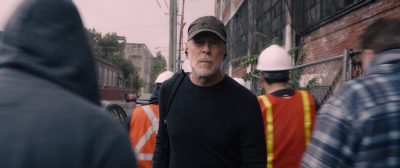
Glass – David Dunn/The Overseer (Bruce Willis) – Photo courtesy of Universal Pictures.
His son, Joseph (Spencer Treat Clark, who played the character in Unbreakable) chides him for not focusing on finding The Horde (as the press has dubbed Crumb’s collection of personalities). (Later we see Charlayne Woodard as Mr. Glass’ mother – again, the same actor who played the role in Unbreakable.)
When Dunn finally confronts The Beast, their fight is interrupted by a horde (sorry!) of cops and the two are sedated and taken to a psychiatric hospital where Dr. Ellie Staple (Sarah Paulson) tries to persuade them they are delusional – along with a heavily drugged Elijah ‘Mr. Glass’ Price (Samuel L. Jackson).
Glass is, as I said, a solid film – if not as brilliant as Split.
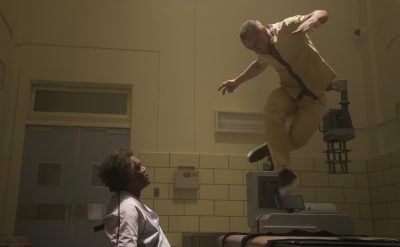
Glass – Elijah Price/Mr. Glass (Samuel L. Jackson) and Kevin Wendell Crumb/The Horde (James McAvoy) – Photo courtesy of Universal Pictures.
The opening act builds tension in much the same way that Unbreakable did. There’s a murky, mysterious, deliberate build leading to Dunn and The Beast’s first confrontation. We get to see Dunn’s most unusual power – a kind of psychic polaroid of someone he touches while in hunting – and it’s extremely interesting to hear Dr. Staple’s take on it later.
The second act, in the hospital, is fascinating for the way Dr. Staples attempts to undermine the belief of her three subjects in their abilities – with varying degrees of success.
The trio are held in rooms that emphasize their supposed weaknesses: Mr. Glass’ brilliance is held in check by doping him to the gills; Kevin’s may personalities are held in check by massive banks of ‘hypnotic lights’ that force him to change personalities if he – or any of the other members of The Horde – try to escape, or harm one of the orderlies who bring them their meals, and Dunn’s room is connected to a huge tank of water that will inundate him if tries to escape.
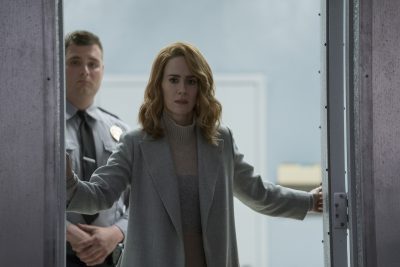
Glass – Dr. Ellie Staple (Sarah Paulson) – Photo courtesy of Universal Pictures.
Every inch of the hospital is also covered by cameras, so even if one of them should escape their room, it will be caught on camera and actions will be taken to curb them.
Shyamalan doles out these details fastidiously. Every detail seems to be important to the same degree as its fellows.
Of course, such a complex system might be gameable – especially for a mind like Mr. Glass’.
Also, considering that we have seen our trip exercise their unique abilities, we have to think that Dr. Staples is either incredibly naïve, or has another agenda.
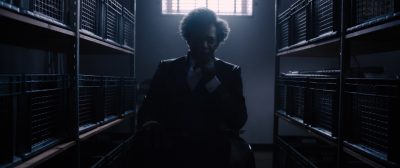
Glass – Elijah Price/Mr. Glass (Samuel L. Jackson) – Photo courtesy of Universal Pictures.
Not helping in any way is the revelation that Mr. Glass thinks of his story as ‘the limited edition,’ rather than a limited series – and his revelation about what kind of story it is comes a bit too late.
Obviously, shooting Glass at a much lower budget of even the most budget conscious Marvel movie means that there are over-the-top action sequences – but this turns a potential weakness into a strength.
The two big Dunn/Beast confrontations are down and dirty, ground level brawls that feel like they are actually hurting each other – the stakes may be low in comic book terms, but they are huge for the two.
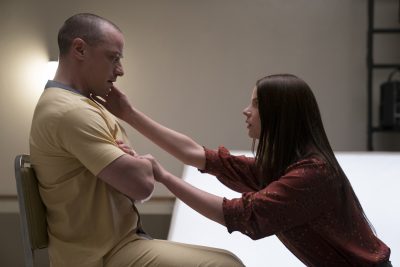
Glass – Kevin Wendell Crumb/The Horde (James McAvoy) and Casey Cooke (Anya Taylor-Joy) – Photo courtesy of Universal Pictures.
The appearance of Casey Cook (Anna Taylor-Joy) doesn’t seem to have a real purpose unless one thinks about extreme duress created our trio of supers. Shyamalan slyly hints that there’s more to Casey than meets the eye – but limits her screentime so we don’t really dwell on it long enough to figure it out.
Glass closes with a trio of twists – none minor, but none as huge as many in Shyamalan’s past films. They give us a hint of a potential Shyamalan-Verse, but not enough – for me at least – to want more (unless Shyamalan should allow other writers and directors play in his playground, the way H.P. Lovecraft encouraged other writers to add to his Chthulu mythos).
Once again, McAvoy gives a bravura performance as Kevin’s many personalities including a few we didn’t see in Split) and definitely the focal character of the film – though Willis did not phone this one in (it’s his best performance in a long time).
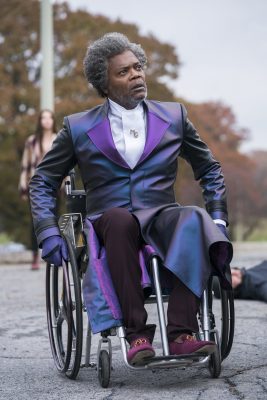
Glass – Elijah Price/Mr. Glass (Samuel L. Jackson) – Photo courtesy of Universal Pictures.
Jackson, as usual, is terrific in limited screentime – like the best magicians, Shyamalan keeps focused on The Horde, while Mr. Glass…
I’m glad I saw Glass and definitely want to get the Blu-ray (hopefully Shyamalan will do a commentary track – with or without McAvoy, Willis and Jackson).
Now to hit RT and see what film those critics thought they were seeing.
Final Grade: B